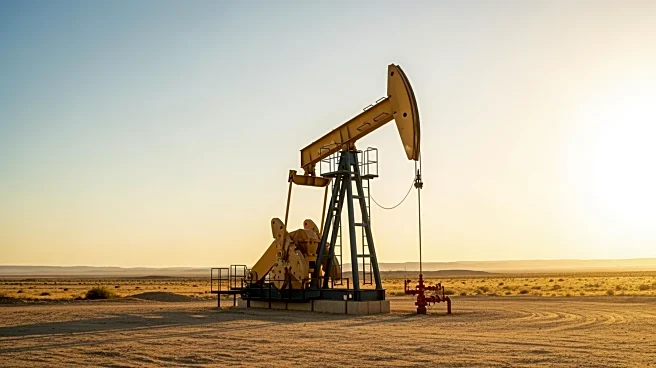What's Happening?
ExxonMobil is set to boost production capacity at Abu Dhabi's Upper Zakum offshore oil field ahead of schedule, according to CEO Darren Woods. The field, developed in collaboration with Abu Dhabi's government-owned
producer and Japan's Inpex Corp., currently has a capacity of 1 million barrels per day (MMbpd). The expansion aims to increase this capacity to 1.5 MMbpd by 2030, with expectations to achieve this target earlier than planned. This development is part of a broader strategy by the United Arab Emirates to enhance its influence in the global oil market, despite OPEC+ production limits. The UAE's current production cap is approximately 3.4 MMbpd, with plans to increase capacity to 5 MMbpd by 2027. The announcement follows a previous declaration during President Trump's visit to the UAE, where ADNOC and ExxonMobil outlined expansion plans without specifying capacity targets.
Why It's Important?
The early increase in production capacity at Upper Zakum is significant for several reasons. It strengthens the UAE's position in the global oil market, potentially increasing its market share and influence. This move could also impact OPEC+ dynamics, as production limits are a sensitive topic among member countries. For ExxonMobil, the expansion represents a strategic investment in a region with growing energy demand, aligning with its long-term growth objectives. The increased capacity could lead to higher revenues for both ExxonMobil and the UAE, supporting economic growth and development. Additionally, the project underscores the importance of international partnerships in the energy sector, as collaboration with entities like Inpex Corp. facilitates technological and operational advancements.
What's Next?
As the project progresses, stakeholders will closely monitor the impact of increased production on OPEC+ agreements and global oil prices. ExxonMobil's discussions with the Iraqi government about potential resource exploration around the Majnoon field indicate further expansion plans in the Middle East. The industry will require continued investment to sustain production levels and develop infrastructure, including technology and data centers. Regional ministers and executives emphasize the need for such investments to capitalize on growing global energy demand. The success of the Upper Zakum expansion could serve as a model for future projects, influencing strategic decisions in the oil and gas sector.
Beyond the Headlines
The expansion of Upper Zakum may have broader implications for the energy transition, as increased oil production could affect efforts to shift towards renewable energy sources. The project highlights the ongoing tension between traditional fossil fuel production and the global push for sustainability. Additionally, the collaboration between international companies and government entities raises questions about geopolitical influences in the energy market. The project's success could encourage similar partnerships, potentially reshaping the landscape of global energy production and distribution.









